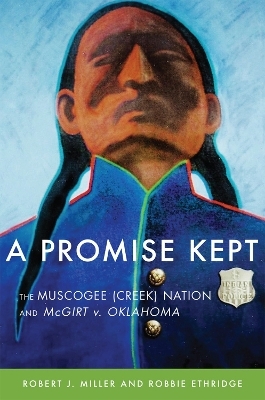
A Promise Kept
The Muscogee (Creek) Nation and McGirt v. Oklahoma
Seiten
2023
University of Oklahoma Press (Verlag)
978-0-8061-9172-0 (ISBN)
University of Oklahoma Press (Verlag)
978-0-8061-9172-0 (ISBN)
Explores the circumstances and implications of McGirt v. Oklahoma, likely the most significant Indian law case in well over 100 years. Combining legal analysis and historical context, this book gives an in-depth, accessible account of how the case unfolded and what it might mean for Oklahomans and the Muscogee (Creek) Nation.
“At the end of the Trail of Tears there was a promise,” U.S. Supreme Court Justice Neil Gorsuch wrote in the decision issued on July 9, 2020, in the case of McGirt v. Oklahoma. And that promise, made in treaties between the United States and the Muscogee (Creek) Nation more than 150 years earlier, would finally be kept. With the Court’s ruling, the full extent of the Muscogee (Creek) Reservation was reaffirmed—meaning that 3.25 million acres of land in Oklahoma, including part of the city of Tulsa, were recognized once again as “Indian Country” as defined by federal law. A Promise Kept explores the circumstances and implications of McGirt v. Oklahoma, likely the most significant Indian law case in well over 100 years. Combining legal analysis and historical context, this book gives an in-depth, accessible account of how the case unfolded and what it might mean for Oklahomans, the Muscogee (Creek) Nation, and other tribes throughout the United States.
For context, Robbie Ethridge traces the long history of the Muscogee (Creek) Nation from its inception in present-day Georgia and Alabama in the seventeenth century; through the tribe’s rise to regional prominence in the colonial era, the tumultuous years of Indian Removal, and the Civil War and allotment; and into its resurgence in Oklahoma in the twentieth and twenty-first centuries. Against this historical background, Robert J. Miller considers McGirt v. Oklahoma, examining important related cases, precedents that informed the Court’s decision, and future ramifications—legal, civil, regulatory, and practical—for the Muscogee (Creek) Nation, federal Indian law, the United States, the state of Oklahoma, and Indian nations in Oklahoma and elsewhere. Their work clarifies the stakes of a decision that, while long overdue, raises numerous complex issues profoundly affecting federal, state, and tribal relations and law—and will continue to do so for the foreseeable future.
“At the end of the Trail of Tears there was a promise,” U.S. Supreme Court Justice Neil Gorsuch wrote in the decision issued on July 9, 2020, in the case of McGirt v. Oklahoma. And that promise, made in treaties between the United States and the Muscogee (Creek) Nation more than 150 years earlier, would finally be kept. With the Court’s ruling, the full extent of the Muscogee (Creek) Reservation was reaffirmed—meaning that 3.25 million acres of land in Oklahoma, including part of the city of Tulsa, were recognized once again as “Indian Country” as defined by federal law. A Promise Kept explores the circumstances and implications of McGirt v. Oklahoma, likely the most significant Indian law case in well over 100 years. Combining legal analysis and historical context, this book gives an in-depth, accessible account of how the case unfolded and what it might mean for Oklahomans, the Muscogee (Creek) Nation, and other tribes throughout the United States.
For context, Robbie Ethridge traces the long history of the Muscogee (Creek) Nation from its inception in present-day Georgia and Alabama in the seventeenth century; through the tribe’s rise to regional prominence in the colonial era, the tumultuous years of Indian Removal, and the Civil War and allotment; and into its resurgence in Oklahoma in the twentieth and twenty-first centuries. Against this historical background, Robert J. Miller considers McGirt v. Oklahoma, examining important related cases, precedents that informed the Court’s decision, and future ramifications—legal, civil, regulatory, and practical—for the Muscogee (Creek) Nation, federal Indian law, the United States, the state of Oklahoma, and Indian nations in Oklahoma and elsewhere. Their work clarifies the stakes of a decision that, while long overdue, raises numerous complex issues profoundly affecting federal, state, and tribal relations and law—and will continue to do so for the foreseeable future.
Robert J. Miller is Professor of Law at the Sandra Day O’Connor College of Law at Arizona State University. He is the author of Reservation “Capitalism”: Economic Development in Indian Country and Native America, Discovered and Conquered: Thomas Jefferson, Lewis and Clark, and Manifest Destiny. Robbie Ethridge is Professor of Anthropology at the University of Mississippi. She is the author of From Chicaza to Chickasaw: The European Invasion and the Transformation of the Mississippian World, 1540–1715 and Creek Country: The Creek Indians and Their World, 1796–1816.
| Erscheinungsdatum | 22.12.2022 |
|---|---|
| Zusatzinfo | 6 maps |
| Verlagsort | Oklahoma |
| Sprache | englisch |
| Maße | 152 x 228 mm |
| Gewicht | 272 g |
| Themenwelt | Geisteswissenschaften ► Geschichte ► Regional- / Ländergeschichte |
| Recht / Steuern ► Arbeits- / Sozialrecht ► Sozialrecht | |
| Recht / Steuern ► EU / Internationales Recht | |
| Recht / Steuern ► Öffentliches Recht | |
| Recht / Steuern ► Strafrecht | |
| Sozialwissenschaften ► Ethnologie | |
| Sozialwissenschaften ► Soziologie | |
| ISBN-10 | 0-8061-9172-4 / 0806191724 |
| ISBN-13 | 978-0-8061-9172-0 / 9780806191720 |
| Zustand | Neuware |
| Informationen gemäß Produktsicherheitsverordnung (GPSR) | |
| Haben Sie eine Frage zum Produkt? |
Mehr entdecken
aus dem Bereich
aus dem Bereich
Erinnerungen
Buch | Softcover (2024)
Pantheon (Verlag)
16,00 €


